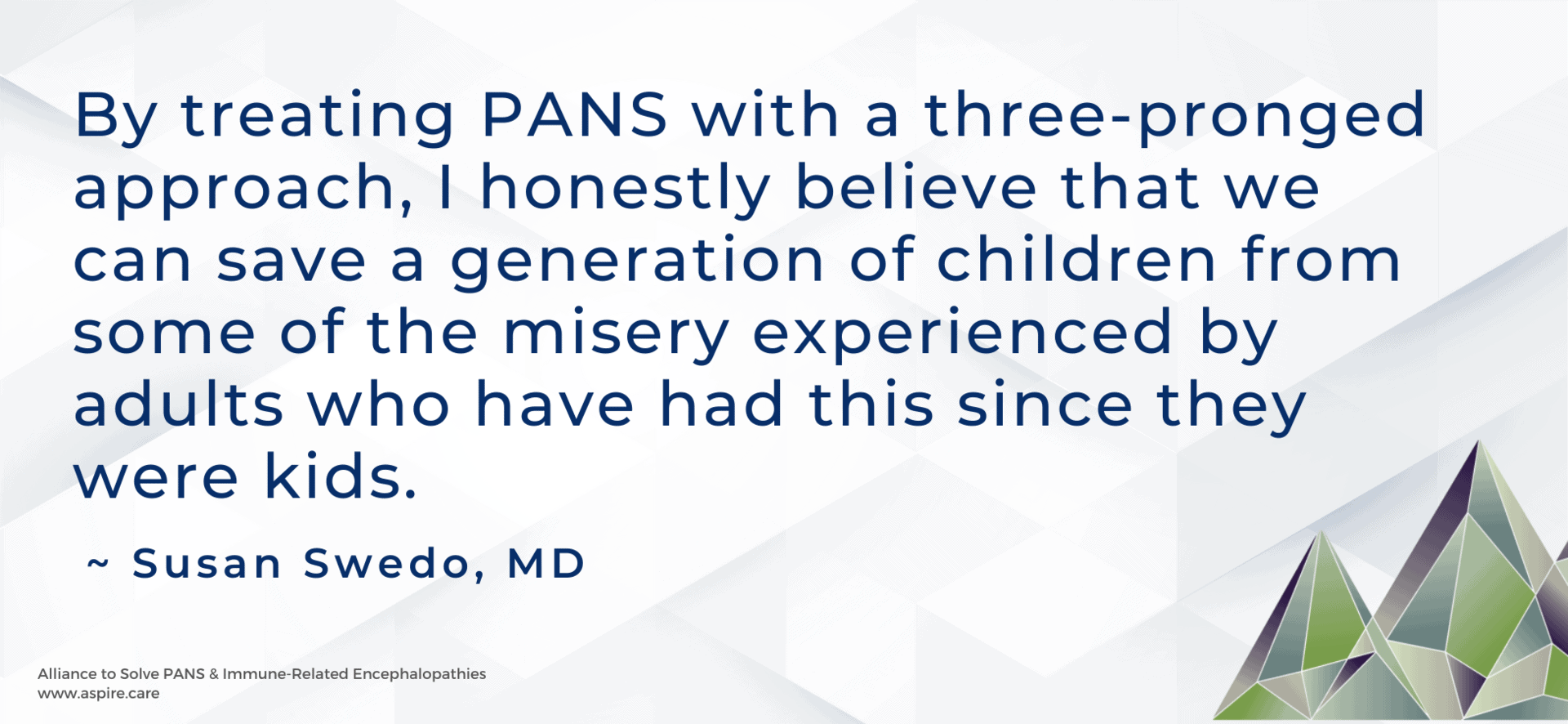We know about PANS/PANDAS. We need the rest of the world to catch up.
Let’s talk about sharing our story and advocacy on PANS PANDAS Awareness Day
I am not sure when the first PANS/PANDAS Awareness Day was. These are some of the dates I know.
- 1978. I had my first PANDAS symptoms.
- 1998. Susan Swedo, MD, published the first paper on PANDAS.
- 2007. I became aware of PANDAS.
- 2009. One son was diagnosed. It should have been both sons.
- 2012. I started on my PANS/PANDAS advocacy journey.
- 2016. I was diagnosed.
- 2018. Our second son was diagnosed, finally.
I wonder all the time what life would be like if brilliant women like Judy Rappoport, MD, and Susan Swedo, MD, hadn’t put the pieces together twenty-five years ago.
There has been a lot of progress, especially in the last five or so years, due to breakthroughs in research by Dritan Agalliu, PhD, Christopher Pittenger, MD, PhD, and Jennifer Frankovich, MD, among others. Then there are the dogged providers who push us forward by diagnosing and treating our community, proving that we can heal. Then there was COVID, which moved the needle in the understanding that an infection can cause neuroinflammation and, ultimately, psychiatric and cognitive symptoms. Then there is the ever-increasing advocacy by parents worldwide, which, as this community knows, is a force to be reckoned with.
Now, we need the rest of the world to catch up.
While PANS/PANDAS is not a household word, awareness is increasing, so the need for education and understanding grows. This year, instead of focusing on one day, October 9th, we have taken the past week to inspire and motivate our community living with PANS/PANDAS to take action not just today but all year.
You have probably heard me say that we can talk about the symptoms, causes, triggers, and treatments all day, but our stories bring our collective struggles and needs to life. This is why, on one day of Awareness Action Week, we shared stories of hope, which were delightful and heartbreaking simultaneously. I want to speak specifically about telling our stories. Sometimes, people feel that the stories of hope, the success stories, diminish how dreadful PANS/PANDAS is. But if you sit and read through them, you see the struggle and the heartbreak.
Our families face challenges every day of the year. These challenges are so life-altering that they are almost impossible to imagine unless you have lived them. Families scrape by trying to afford medical treatments that most state governments don’t seem to care enough about to pass insurance mandates for, no matter how many years we spend talking with legislators. It is one of the worst feelings in the world to simply not be able to pay for your child’s or your own medical expenses; it is gut-wrenching. Sometimes, there are no more belongings to sell off and no more hours of work you can try to get, especially if your child is too sick to hold down a job because you must stay home with them. Or you are too sick to have a job as an adult living with PANS. And of course, so many doctors shut the door in our faces saying – no, PANS doesn’t exist, it is all in your head, your child needs to be on more psych meds than you can count, this has no medical basis, adults can’t have it, only kids have it, and don’t forget it is all your fault for being a bad parent. Additionally, many families spend days preparing for IEP or 504 meetings only to sit down and list all the things their kids cannot do, all to have the school refuse to understand how different this neuroimmune disorder is from other behavioral disorders they are used to students having.
Those are the easy things to talk about. There are more challenging things to talk about, like the fear your child will harm themselves or take their life because it is the unfortunate truth that this happens; we have to talk about this. Then there is the topic of the distress all these symptoms cause; they are genuinely debilitating for many patients. Then there is the anguish of thinking about if you or your child will ever get better. Will this get better? Will it get worse? What will happen next?
So yes, we really need those stories of hope and success. We need the stories that tell the hard truth. We invite you to share your story.
October 9th is one day. We live PANS/PANDAS 365 days a year. Take action with us. Please keep supporting our work, sharing your story, our handouts, and videos; keep talking to legislators, doctors, friends, nurses, teachers, school nurses, and anyone you meet. People listen. Some people need to hear about something new five or seven times before they start to pay attention. Every time you talk to them, it gets you one step closer to them paying attention. Awareness is one thing; education and understanding are even more productive.
Your support and action contribute to advancing the PANS/PANDAS community, bringing about a positive transformation in the lives of those affected by this condition. We wish everyone a positive PANS/PANDAS Action & Awareness Year.
In hope and healing,
Gabriella True
ASPIRE Board President

